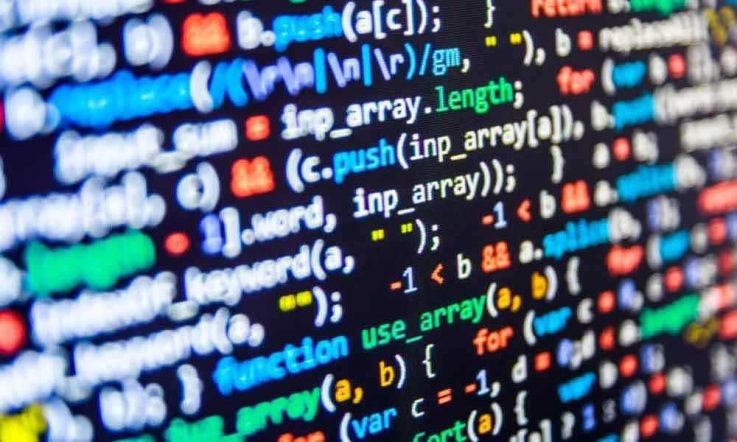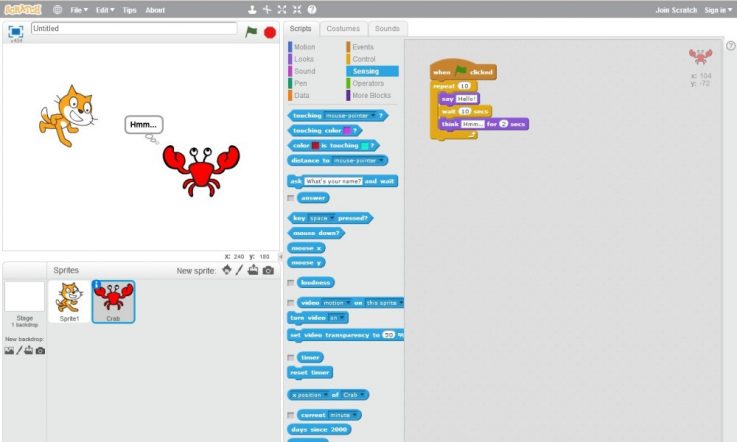Hello, you're listening to a special edition of The Research Files – I'm Jo Earp. My guest this month is Professor Tim Bell of the University of Canterbury in Christchurch, New Zealand. His Computer Science Unplugged project is widely used internationally, he's received many awards for his work in education and he's one of the keynote speakers at the Australian Council for Educational Research 2016 Research Conference in August. The title of his keynote is 'What's all the fuss about coding?'
Jo Earp: Tim's main research interest at the moment is Computer Science education, so I started by asking him to take me back to his time at school and explain what 'computer science' looked like in a classroom context and how he got involved as a youngster.
Tim Bell: Back at school I was fortunate our school happened to have a computer – very few schools had computers (this was back in the 70s), so I just naturally moved towards the computer room and got into computing through that. But the thing that really got me into the research was when my own kids were at school and I was asked to talk to their classes about what I do for a living – this was in the early 90s when Computer Science wasn't really visible in the schools. So, that's actually the origin of the Computer Science Unplugged material that we've developed because it was 'how do you talk to primary school kids about what Computer Science is?' and just using a computer, particularly at that time, wasn't really an option let alone [trying to make it] engaging.
JE: Professor Tim Bell, talking about Computer Science Unplugged which, let me see if I've got this right, is teaching Computer Science without a computer. I asked him to tell me more.
TB: That's right and particularly without programming, so traditionally the barrier to getting into Computer Science is that you must learn to program, then we'll let you do the cool stuff and Computer Science. The idea of Unplugged is that, no, you don't need the programming and therefore not even the computer but you can engage with the really cool ideas. It's turned out to have a lot of benefits. Kids do need experience with computers and so on, that's not to say throw away the computer altogether, but it's to get them thinking. We're finding there's a group of kids that really want to know what the cool ideas are before they're prepared to learn programming.
One of my colleagues has pointed out that Computer Science is as much about programming as Astronomy is about telescopes and you get the idea that 'learn to use this telescope, it's so cool', and some kids will be really interested in telescopes in their own right, but the reality is that it's looking at the stars and planets and things that actually gets kids excited.
It's the same with Computer Science – we've kind of forced them to do the telescopes first and then say 'well, if you survive that then maybe you'll like the bigger science around it'. Unplugged turns it the other way around.
JE: You're listening to a special episode of The Research Files with Professor Tim Bell. Next, we discussed the kind of resources that are being created for Unplugged: What do they look like? What kind of activities do they involve? And again, this is in a school context.
TB: There's quite a big range. They're all pretty kinaesthetic, they involve running around the playground or working with cards or string and things like that. One of the key things with them is that they have a very small list of instructions.
So, for example, to teach binary numbers we have cards with some dots on – one card with one dot, another card with two, another with four and so on. And the first thing is to say to the kids 'after one, two and four, how many dots on the next card?'. That itself is showing some understanding of Computer Science when they spot those patterns. And then the instruction is 'turn over some of the cards so that there are 11 dots showing'. Now they're engaged with the idea of binary, that things are on or off and so on, but it's just using familiar material and scaffolding that enables them to take what they can do (which is counting dots) but get into what we want them to do (which is representing numbers using just two different values – hidden and not hidden in this case).
There are all sorts of activities that involve following lines in the playground in chalk, challenges and so on. Each one is intended to take an idea from Computer Science and enable kids to get engaged with that idea. And then, now that a lot of these topics have entered the curriculum, they can then go off and write a program that does some of those things, or that simulates them so that they get the full experience of what it means. But the idea first, then implemented on computing.
JE: And the Computer Science Unplugged, that's for primary and secondary.
TB: Yeah, it was originally designed for primary schools. The material is all free, it's open source and it's quite widely used. It was intended for primary school initially but we've found actually that people use it at all levels – universities, senior citizens, science centres, family fun days, that sort of thing. So, it provides some resources where people can get engaged quite quickly. The other thing is that as Computer Science is becoming a subject in schools around the world, one of the bottlenecks is getting teachers up to speed. So, we've got teachers who have no background in Computer Science who suddenly need to teach these sort of topics. We find that if they're working with cards and paper and strings and things that's all familiar resources – you don't need to install it, you don't have to have the right version, there are no compatibility problems, all those kinds of things. So, for teachers it means that they can get into it really quickly as well.
When things go well you might do some Unplugged activities, get the kids thinking about what they want to do and then get them on the computers writing programs and so on. But, it's a good go to if the computers aren't working. The other thing is of course, as we get into it there's a lot of fear. If you're a teacher and you're suddenly told you have to teach this thing called Computer Science (which you may not even know what it is really), then being able to work with familiar resources is a really easy way to get into it, rather than being told 'by the way first of all install this, buy this robot kit and get funding for this and learn how to do that ... it's not compatible ... sort that out' and so on. So it's a whole different way to get into it, a much softer way to get into things.
JE: Now, we'll put the links into the podcast transcript on our website, so all the links to the resources and so on that have been discussed today. Tim's also been involved in the design and development of New Zealand's new Computer Science curriculum - that's for high schools. I asked him to explain the kind of things that it focuses on and whether it's similar to what we're doing here in Australia with the Digi Tech [Curriculum].
TB: In New Zealand it came in in 2011 and the intention was, it's for the senior part of high school, it's optional but it's a broad coverage of the areas of Computer Science. So, again, programming is a part of it but very deliberately includes a whole lot of other ideas like artificial intelligence, computer graphics (how do you write the programs that do graphics?), computer vision (how do you write the programs that recognise faces and objects and photos and things like that?) and human/computer interaction (what's the psychology behind the way people design interfaces to try and make them easier to use? or even more fun, what's the psychology that makes them hard to use and frustrating? which is not helpful if you're a designer but it's fun to look at, at the high school level). So, a lot of those kind of topics are in the curriculum – very broad, quite shallow, just to expose kids to real experiences of those topics without having to again do a lot of programming or get too deep technically.
But the biggest problem that we have, and it's an international problem, is that kids just don't know what the subject is. When they're deciding whether or not to do it beyond high school level then they're making decisions based on misinformation, based on stereotypes and not knowing what kind of jobs there are and what kind of skills are needed for it. So, again, going in unprepared without the right sort of background.
The idea is really a way to get kids to have some idea what this thing is and then particularly for girls. If you ask a high school girl what Computer Science is about and whether they'd want to do it the stereotype is someone working on their own and that it's all about computers. The reality is Computer Science is working in teams, working for people, solving their problems and it's not about computers it's about people, it's about developing stuff that makes people's lives better, that helps people to work together, helps them to communicate and helps with health issues and things like that. So it's a matter of just exposing [students to the fact] that's what people really do when they get jobs in this area. That's the direction that our curriculum has gone in.
JE: Tim Bell is a Professor at the University of Canterbury and we have been discussing his work in New Zealand today, but he also works internationally. So my next question was: Which countries have jumped out of the blocks on STEM and in particular Computer Science? Who's leading the way?
TB: It's kind of a game of leap frog in some ways – lots of countries are doing things. Traditionally South Korea and Israel have always been ahead of the game. They've taught reasonably advanced Computer Science in their high schools and they have colleges of education that teach Computer Science educators and so on. Estonia has famously made computing a really important part of its curriculum from the very first year of school. And in England they adopted a curriculum about a year-and-a-half ago which has compulsory Computing (which involves programming, computer science and computational thinking concepts) right from the first year of school. And of course now Australia is doing that as well. In America, state by state it's different. Some states are doing quite well, some states are still catching up.
Of course a lot of it depends on how much the leaders of the countries, the leaders of education, understand what this is about. One of the things that's slowed it down is mixing it up with eLearning or using computers for other subjects, versus learning about computing as a discipline in itself. But all the countries are sort of gradually catching up with each other, sharing resources and it's developing around the world.
JE: Finally then, I mentioned in the intro to today's podcast that Professor Tim Bell is one of the keynotes at this year's ACER Research Conference. The theme of the conference is Improving STEM learning – What will it take? Without stealing his thunder, I asked him to explain what he'll be talking to delegates about?
TB: I've actually got two things I'm presenting. The keynote is called 'What's all the fuss about coding?' I just want to be able to unpack a little bit around – What is this thing called coding? Why is it becoming popular around the world? And, why should we care about it? Also I'm speaking at the Conference Dinner, which is going to be more of an entertainment kind of thing. I'll be using some of the materials from Unplugged ... a lot of it is based around food or concepts relating to food and social situations. So we'll try and do something at the Conference Dinner that actually is Computer Science dinner-themed.
JE: Well, we look forward to welcoming you to Australia in August. Until then, Professor Tim Bell, thanks very much for talking to The Research Files.
TB: You're very welcome.
You've been listening to an episode of The Research Files, from Teacher magazine. To download all of our podcasts for free, visit acer.ac/teacheritunes or www.soundcloud.com/teacher-acer. To find out more about the research discussed in this podcast, and to access the latest articles, videos and infographics visit www.teachermagazine.com.au
To access free learning activities from the Computer Science Unplugged website and find out more about the project visit http://csunplugged.org/
Computer Science Unplugged is a project by the CS Education Research Group at the University of Canterbury. The group has collaborated with others to produce the Computer Science Field Guide (http://csfieldguide.org.nz/) - a free online resource for teaching Computer Science to high school students.
Professor Tim Bell is a keynote speaker at the ACER Research Conference 2016. The theme of the conference is 'Improving STEM Learning: What will it take?' It takes place from 7-9 August at the Brisbane Convention and Exhibition Centre. To register and for program details, visit www.acer.edu.au/rc



